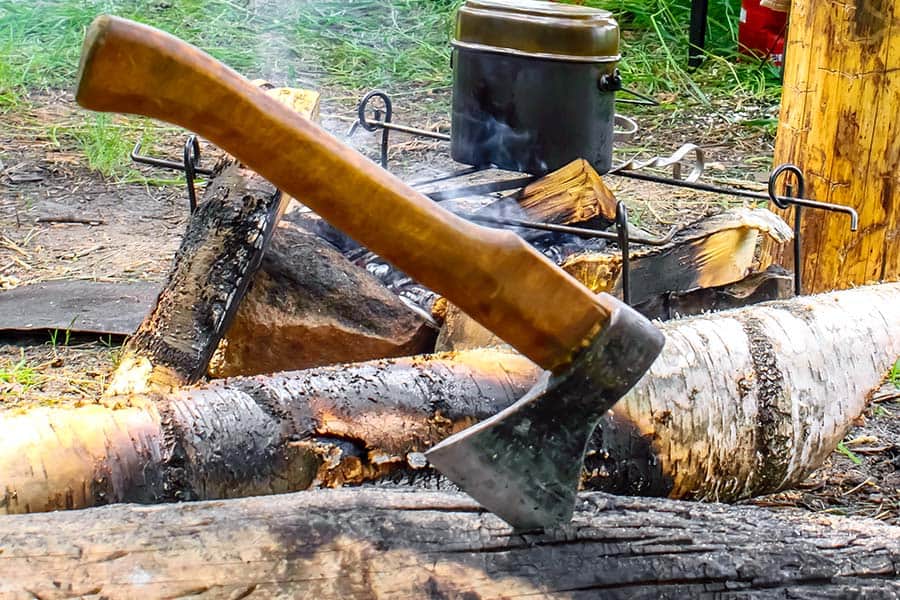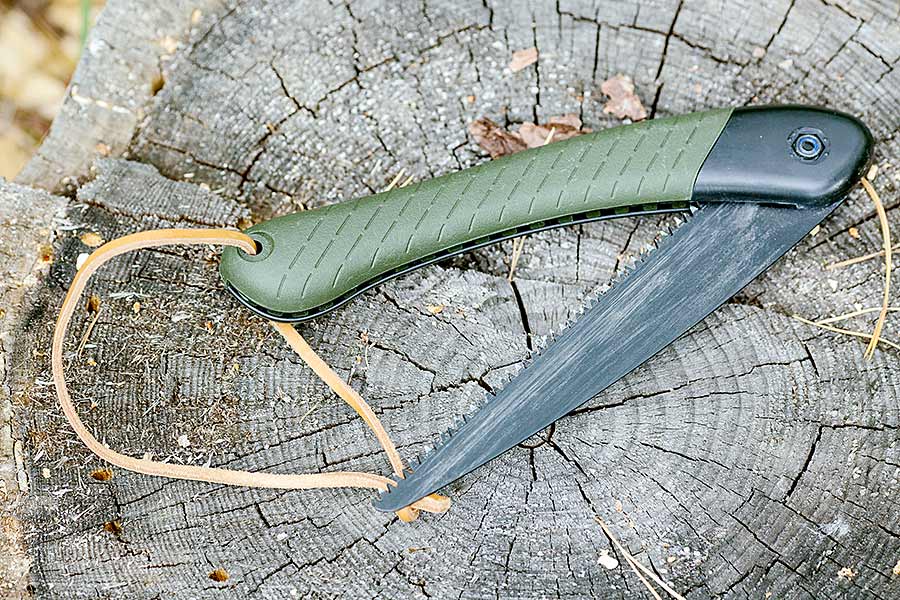
When you get the urge to escape the city life for a weekend, nothing beats camping in your favorite wilderness area. As you pack up your gear, you may wonder what supplies do you actually need.
Do you need an axe for camping? You do not usually need an axe for camping, although they can be helpful for chopping firewood, among other things. Also, there are a few alternatives you can use if you don’t have an axe or forget to pack one.
We put together some tips for buying the right axe, how to maintain and use your axe, and what you could pack instead of an axe for your next outdoor adventure. Read on to learn what options you have.
What Tasks Can You Use an Axe for While Camping?
Axes come in a full range of shapes and sizes, depending on their intended purpose.
- Heavy axes with a long handle are suitable for chopping down large trees or cutting them into shorter segments.
- Splitting mauls look much like axes but have a larger wedge shape head to split a log into pie shapes that will fit in your fireplace or campfire.
- Small axes, or hatchets, with short handles, are useful for breaking larger wedges of wood into kindling or cutting down small trees.
Small axes are the best choice to use while camping. These axes can be lightweight and easy to carry. When building a campfire, it’s best to split more substantial pieces of wood into smaller pieces that burn easily. Often, it’s more convenient to use a smaller, lightweight camp axe for making kindling and doing other camp chores than using the unwieldy full-sized axe.
However, if you camp in an area that doesn’t allow fires or where you’re not permitted to find your own wood due to conservation, your axe can still be useful. Many axe enthusiasts may caution against using your axe as a hammer, but you can use the back, unsharpened side of the axe to pound tent stakes into the ground if you don’t have any other method.
A word of caution – when striking metal against metal wear protective eye gear, so if a shard of metal flies off, the protective glasses will prevent injury.
In a pinch, you could use the metal head of your axe to spark a fire, though hardened steel may make it difficult to get a spark. If you have a piece of flint or ferro rod, you can use the axe as a striker. Carefully hit the flint or rod against the blade towards your tinder. However, this could dull or chip the edge of the axe.
Finally, you could also use your axe as a knife. While the blade may be unwieldy, you could use it to clean a fish, or process game you may have caught or killed.
We have a post “9 Tips You Should Know Before Going Camping” to help you prepare for your trip.
What to Look for in a Basic Axe
The best axe you can have to use while camping is a small hand axe or hatchet. You can purchase lower-priced axes and hatchets from big box stores for less than $20, but these stores usually have a small selection. Online, you can still find affordable axe options that are of higher quality.
If choosing a wooden handle, look for where the grain of the wood is parallel to the handle. The proper grain will result in a sturdy handle that will be less likely to splinter or crack with use. The handle should be ergonomic, with a thicker section right below the head for you to comfortably hold it one-handed, and a thin section towards the end for your second hand.
Avoid straight, plastic, or metal handles. Straight handles will cause your hands to slide more while swinging. Plastic or metal handles could be slick and hard to grip. Even varnished wooden handles tend to cause blisters.
A good axe will have a good quality steelhead. Some manufacturers may not properly sharpen their axes before shipping, so test the sharpness after you purchase it. A sharp axe will cut a piece of paper without tearing.
Hults Bruk makes a popular camping hatchet, the Almike, and it is hand-forged from Swedish steel. It has a sturdy hickory handle, and you can carry it easily in a backpack. Perfect for all the tough jobs around the campsite. You can purchase it here.
To learn more about this quality hatchet, watch the video below.
How to Safely Use an Axe for Camping
Misusing an axe could cause you to hurt yourself or someone around you severely. Always observe good safety habits while using your axe. Check out this infographic for more info.
- Always maintain a safe distance from other people while using your axe, in case the axe slips from your hands
- Maintain a sharp blade, as dull blades are more likely to slip or recoil
- Store your axe safely when not in use, such as covering the edge with a cover
- Keep the axe away from children and pets to avoid accidents
- Hold the axe just below the head with your dominant hand. If using two hands, your non-dominant hand holds the handle towards the pommel (or end)
- Make sure you have a proper stance and excellent grip on your axe when swinging, as tripping, falling, or slipping can cause you to miss your target
An age-old adage says, “Take care of your tools, and your tools will take care of you.” However, if you are careless with your axe, you are more likely to hurt yourself or someone else around you.
Caring for Your Axe
If you don’t properly maintain your axe, you might as well not bring it with you camping. A dull, rusty axe with a dried out handle will be more likely to break or injure someone than provide you with ample firewood.
Be careful not to chip the blade of your axe. The sharp edge of the blade is very thin and can easily chip if you hit a rock or piece of metal. Maintain a sharp edge on the blade using proper sharpening techniques, which you can easily find online.
Do not leave your axe exposed to the elements. If a wooden handle stays wet for long periods or goes through cycles of getting wet and drying out, the handle will splinter or crack, or the head of the axe may loosen. If the head of the axe gets loose from the handle, it could fly off next time it’s swung.
An unvarnished, wooden axe handle will stay like new if you apply boiled linseed oil to it regularly. The oil will also give the handle a nice, dark sheen.
Are There Any Alternatives to Carrying an Axe?
If you forget to pack your axe, or choose not to carry one due to safety concerns around children or pets, there are several other alternatives to carrying an axe. The best tools you could pack instead of an axe include a good knife and a mallet.
A sharp pocket knife can do many of the same things an axe can do, except perhaps chopping down a tree. If you are patient enough, you could trim off kindling from a larger piece of wood with a pocket knife. Better yet, pocket knives fit easily in your pocket or backpack. Pocket knives are also much easier to use if you’re cleaning freshly caught fish or game.
We have a post about the legalities of carrying a knife while camping, read it here.
If you’ve ever pitched a tent, you know that sometimes tent stakes that hold the tent to the ground often refuse to penetrate hard or rocky soil. Pack a hammer or mallet to pound the stakes into the ground. The mallet or hammer will also come in handy for other tasks around the campsite.

A folding hand saw is another option that is convenient and lightweight. The saw will easily fit in a backpack or even a pocket. This type of saw will have large teeth, a rust-resistant blade that locks into place when open. You can use this to cut smaller limbs into usable pieces of firewood.
Never bring firewood from home to your campground. Instead, buy it from a supplier near the campground. Buying or collecting firewood at your camping destination helps prevent the transfer of invasive species.
For most established campgrounds, as long as fires are permitted, you may often be able to purchase firewood from the ranger station or camp attendant. Even inside the city, many stores and gas stations may carry bundles of firewood for use in a residential fireplace. If you decide to skip packing an axe, you can still enjoy a fire by purchasing firewood so you won’t need to worry about cutting it yourself.
Axe or Not – Get Out There and Enjoy Nature!
When camping, having an axe is not a necessity though they sometimes come in handy. Whether you have an axe or choose not to carry one, always remember to stay safe and have fun while camping!
As you get ready to head out on your camping adventure, here are some other posts that will help you have a better experience.





